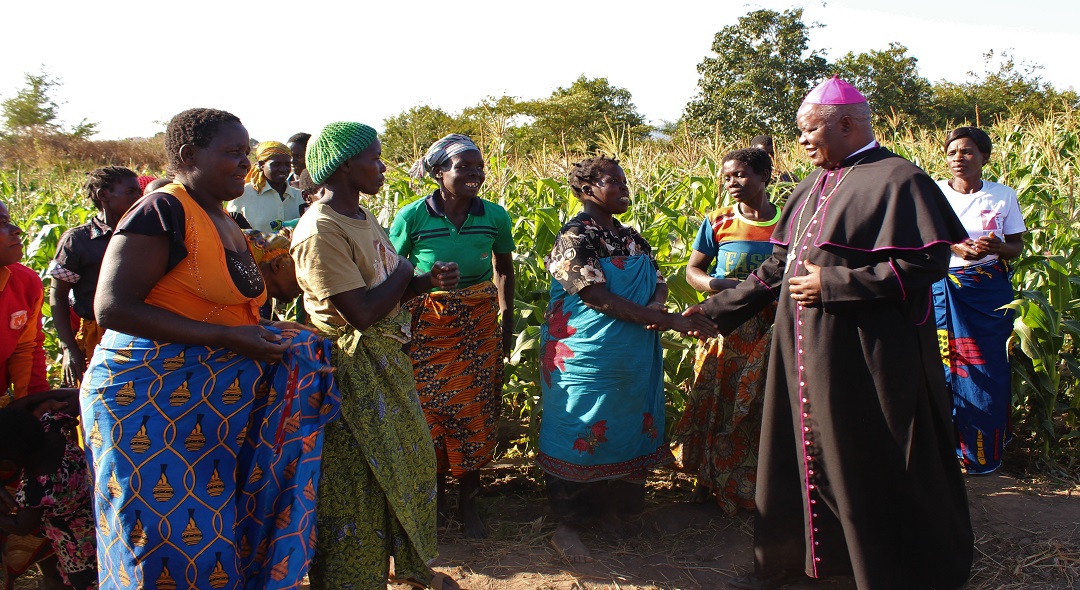
Embracing Development and Spirituality: A Call for Development Workers
By Vitumbiko Ngwira*
The smoke curled its way up from the thatched house in Wiliro, as we went around the household admiring the fruit orchard that we had helped establish for Mr. Ipyana and his family (not a real name). I wondered whether the poverty of Mr. Ipyana was being taken away with the smoke.
Mr. Ipyana was our SORT (Sustainable Options Recommended for Testing) project beneficiary. We were a team of 5 field workers from Lusubilo Community Based Organization, supervising our interventions. The greatest achievement for any development worker is to find communities living self reliant lives while owning and finding sustainable solutions to their social-economic gaps. We were contended, feeling like accomplished development workers seeing Mr. Ipyana gradually graduate from poverty.
As we were about to get into our Toyota Land Cruiser to go the next household on our schedule, Mr. Ipyana came to me and said, ‘we thank God for your interventions, for without Him, no development is possible’. This reminded me of my social ministry lecturer who insisted that any development work without God is incomplete.
Before we delve deeper into our discussion, it is relevant to have an understanding of spirituality. Narrowly put, spirituality is the fire within; that which pushes us to be and do what we do in relation to the Supreme Being and the community. It shapes our values and convictions about who we are. So, where does spirituality and development meet?
Development work is a sacred work. This is not disregarding other professions. Development work begins with Jesus; everything he did was to empower the disadvantaged to live self sustaining lives. His mission becomes more vivid in Luke Chapter 4; 17-21.
The Spirit of the Lord is of the Lord is on me, because he has anointed me to preach good news to the poor. He has sent me to proclaim freedom for the prisoners and recovery of sight for the blind, to release the oppressed, to proclaim the year of the Lord’s favour.
It is proper to keep in mind that development work is the ministry of reconciliation which entails moving people closer to glorifying God by living in right relationship with God, with self, with others and with the rest of creation (Corbert &Fiffert, 2009). Once we understand this, we will never think ourselves as solutions to people’s poverty. How then can we help people to develop? In Malawi more than 80 percent of people live barely to survive and almost every Malawian knows poverty very well. That is why it is crucial to understand development in its entirety.
Furthermore, as development workers we have to understand that our primary relationship should be with God. We have to clearly understand that we were created to serve and give praise to the creator through thoughts, words and actions. This should be clearly understood by all development workers. This will enable us to respond to the experience of those suffering and indeed of our own experience.
Sustainable development work constitutes a faith based response to social gaps. As a result of this all development workers are called to link faith and development. Perhaps, that is the reason why Peter Henriot repeatedly emphasizes the importance of theological reflection as part of development work.
It is, therefore, imperative to make sure that all development interventions do not disregard the faith component. It is for this reason that it is important to begin our work with prayer. Sustainable social-economic change involves a constant connection between theological reflection and all the stages in the process of development.
From the above brief reflection we have seen that development and spirituality are inseparable. We have also appreciated the sacredness of development work and understood that all work ought to be linked to faith. In the next article we will look at some of the challenges of linking spirituality to development work.
References
Corbert, S, &Fikkert, B. (2009). When helping hurts . Chicago; Moody publishers.
Wijsen, F, Henriot, p, &Mejia, R. The pastoral cycle revisited. Nairobi; Paulines Publications Africa.
*Vitumbiko Ngwira is the Deputy Director of Lusubilo Community Based Organisation
